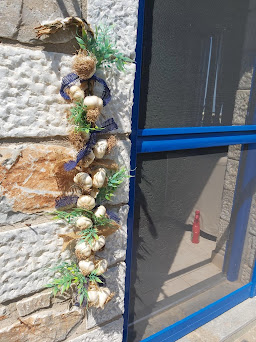'Do they like Greek food?' I asked the grandmother of two teenagers who had been pondering a trip for the trio to visit us.
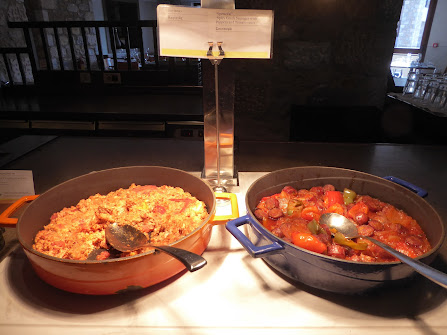 |
| Greek Kagianas (eggs) and Spitsofai (sausage) |
'I don't know. Do you have a Wendy's or Jack in the Box in your village?' she replied, referring to two U.S. purveyors of fast-food, much like McDonald's.
I assured her we did not and that even the nearest McDonalds -- thankfully -- was a four-hour drive away in the heart of big city Athens.
Now, a year later, the trio has yet to come visit. I wonder if my answer had something to do with it.
 |
| Greek mezes (starter plates) offer a variety of flavors |
And I still ponder that conversation. Every so often, as we sit down to some mouth-watering multi-course Greek meal at one of our local eateries, I wonder how the young guests would react to the spread before us. Then I wonder why one would come to Greece and not try the local cuisine.
While the ancient Greeks and Romans are said to have dined on locust and beetle larvae, that hasn't been a practice carried into the present day in Greece, a country that is the poster child of the Mediterranean diet with its olive oil, seafood, fresh veggies and fruits.
 |
| A meal out with friends - many dishes, many hours |
In fact, that conversation made me ponder eating habits in general on both sides 'of the pond'. I went in search of eating habits on Google and one of the first things I learned is that about two billion people eat insects daily and more than 1,000 species of insects are known to be eaten in 80% of the countries worldwide. I can assure you I've never seen an insect in food served here - not even by accident!
Other quirky eating behaviors that my Google search revealed were:
* Several sources claim that most Americans eat fast food -- defined as mass produced food for commercial resale -- of the McDonald's and Kentucky Fried Chicken type between 1 - 3 times a week.
 |
| KFC Extra crispy chicken breast 510 calories |
* Europeans eat on average less than one tablespoon of peanut butter per year as the product quality can vary, it can be difficult to find, and as I can attest, it is expensive when compared to U.S. peanut butter. On the other hand, shelves are stocked with Nutella, a reasonably priced sweetened hazelnut cocoa spread used on everything from toast to crepes.
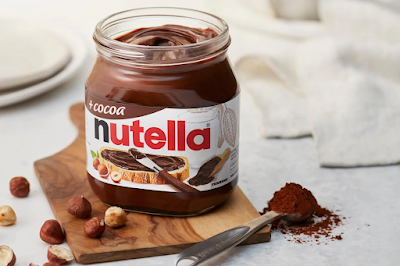 |
| Nutella - a popular spread |
* Americans eat larger portions and consume what they eat more rapidly than do those in Europe. We've found the opposite on portion sizes in Greece and usually have plenty of take-home at the end of a meal. As for speed of dining, I have to admit that it did take some getting used to the two- and three-hour meals here, but once used to it, we find it rather pleasant.
 |
| Greek 'chips' plentiful and fresh and not served with ketchup. |
*The farm-to-table concept is alive and well in Europe. Even a hamburger and fries ('chips', as we call them here) will look and taste different than those in the States as the potatoes used are fresh, not frozen. And the potatoes really are farm fresh as evidenced by the produce section of our local supermarket where they are displayed with moist mud still caked on their skins.
 |
| Fresh picked - the mud hasn't dried yet. |
Thoughts on Food
Most of our visitors have been delighted to try local foods. I purposely wrote that 'local foods' because we aren't limited to just Greek dishes here anymore. Our area's culinary vibes have definitely been changing in the last couple years. You might be surprised at the variety of food offered either in, or near, our small Greek fishing village in the southwestern Peloponnese these days:
 |
| Pizza Manina's pizza rivals that we've had in Italy |
Take pizza for instance. We have at least one place in each of the villages (Kardamyli, Stoupa and Agios Nikolaos) that make and serve pizza. Now it may not look or taste like that pizza you get 'back home' but it certainly reminds us of pizzas we have had in Italy. The photo above was taken at a place in Kardamyli. The pizza on the right is made with fresh Burano cheese, basil and fresh tomato sauce.
 |
| The 1866 Burger is hard to beat |
We can also get hamburgers at several places now - but they were a bit scarce back in 2014 when we bought the house. Again, they won't be like your favorite 'back home', as nothing is ever exactly the same. However, we've found our favorites and they are mighty tasty despite being served without mayo, mustard and ketchup. The 'chips' shown above are served with a sweet chili sauce that makes my mouth-water just writing about it!
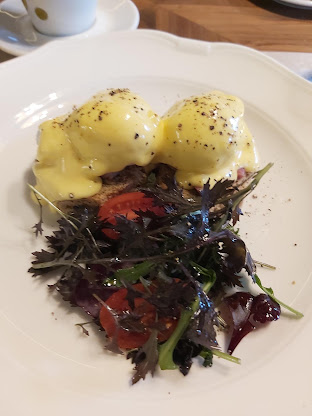 |
| Eggs Benedict with a side salad - just the right size |
Breakfasts options have also changed in our part of the Greek world. As new tavernas and restaurants open or old favorite's change their menu's, the options for 'breakfast out' have multiplied. We have two new places in our village -- one a year-round restaurant and the other a seasonal cafe -- that each offer breakfast plates with a side of salad instead of carb-heavy potatoes, beans, and toast. Again, the meals aren't prepared like 'back home' because ingredients differ. In the egg dish above, small slices of whole grain bread replaced the traditional English Muffin.
 |
| 'Toast' at breakfast means a sandwich |
For a more traditional Greek breakfast, eggs kagianis, scrambled with fresh tomato, sometimes cheese, and spitsofai, thick chunks of country sausage cooked in tomato sauce with peppers, (shown in the first photo in this post) are a mouth-watering change from traditional 'eggs over easy and toast'. However, one of our favorite breakfasts, or anytime snacks is 'toast'. And when one orders 'toast' be prepared to receive a plate with a toasted cheese and ham or turkey sandwich with a side of potato chips. It is one of our go-to meals and it still costs less than five euros at the fanciest of places.
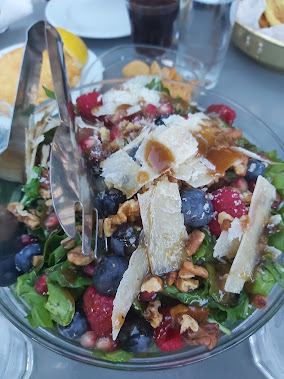 |
| Fresh berries and parmesan cheese made this salad pop |
I remember telling a friend who'd been thinking of a visit a few years ago that it would be difficult to find a lettuce-based salad. We had the traditional Horiatiki, better known as Greek salad, and another traditional salad made with cabbage and carrots on most menus. Not so, anymore! Today the salad choices at most restaurants are many and include some amazing lettuce salads like the one pictured above.
 |
| A 'small' meze plate for two at a long-time favorite taverna |
While the variety of our food selections have increased in recent years, there is still nothing like a good Greek meal served at one of our local, long-time favorite tavernas. The mixed grill plate pictured above is a good example of traditional Greek food. From left, clockwise, there is hot pita bread, tzatziki (yogurt, cucumber, garlic), a Mani sausage, eggplant 'balls', meat balls, cheese, horiatiki salad, with cucumber, olives and tomato, Graviera cheese (like Gruyere), and in the center, cheese balls.
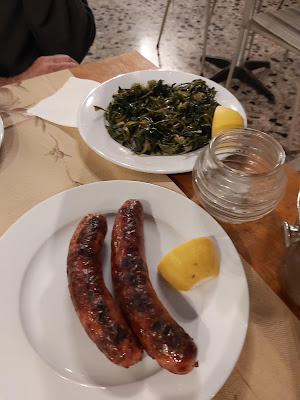 |
| Mani sausage foreground, wild horta in the back |
Horta is the name for cooked greens here. There is nothing like wild horta (harvested from hillsides and olive groves) served with some fresh olive oil and lemon juice. The horta pictured above had been plucked from the taverna owner's olive grove earlier that day. Someday I plan to have a tutorial in harvesting 'horta' so that we can enjoy these greens at home.
 |
Roasted pepper stuffed with spicy cheese
|
Vegetable dishes are hard to beat. The produce is fresh, and the dishes made flavorful with spices and other ingredients. One of our favorites is the stuffed pepper with spicey cheese sometimes served hot out of the oven and other times served cold.
.JPG) |
| Vegetables as a side to meat dishes |
Of course, you can't write about eating locally and not mention fish and seafood when you live in a Greek fishing village. We still chuckle about the night that three of us dined at Vezuvios, one of two local fish tavernas. We all wanted to try the seafood spaghetti and asked the owner -- a friend of ours -- if a 'portion' as they call servings here would be large enough for three. He said not to worry, he would make it big enough for three. When it appeared in a giant paella pan, we knew we'd all have plenty for that dinner as well as leftovers for the following night!
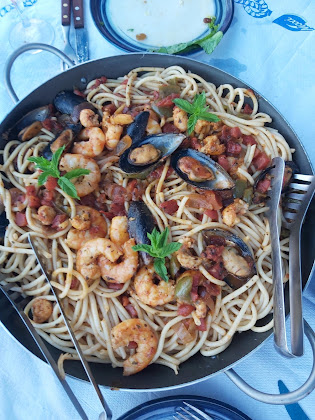 |
| Seafood spaghetti a favorite in our village |
And just as any good meal is ended with dessert, I think a tale about food should end with desserts. Here is one of the best to be had right here in our village, Agios Nikolaos:
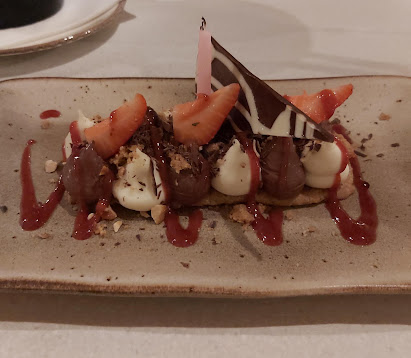 |
| This culinary art from Medikon tasted as good as it looks. |
And even closer to home, we had this wonderous selection at the Kafenion in Agios Dimitrios, about a 10-minute walk away:
 |
| Cheese pie, walnut cake, lemon cake and ice cream! |
I may not ever convince the grandmother and her teen traveling companions to visit, but hopefully this post has given others among you some food for thought and thoughts of food, as you start planning your travels to Greece.
That's it for this week. As always, our thanks for the time you spend with us and hope to see you back here soon. Safe travels to you and yours ~












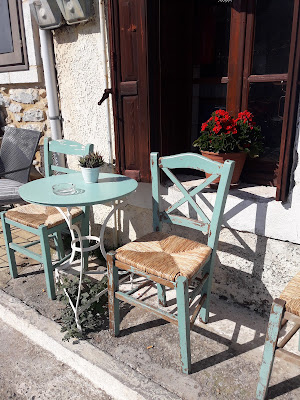

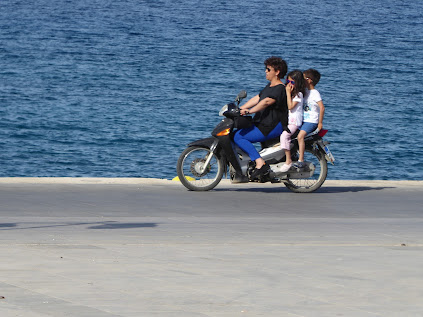


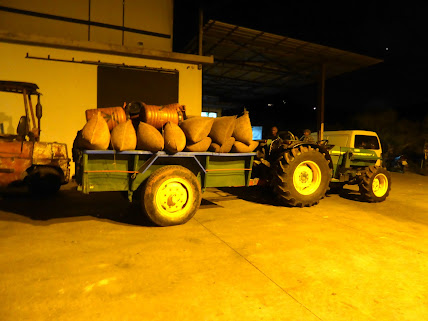

















.JPG)






